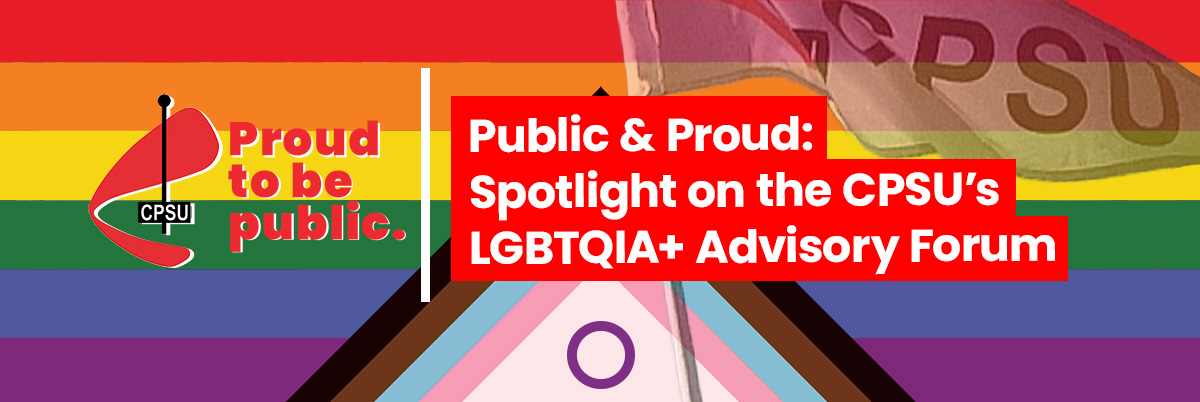
Over the past 6 months, I have had the pleasure of organising LGBTIQA+ workers across the State Service to build a claim which reflects the needs of our diverse community. From these meetings, we have built and put forward several claims which we believe will lead to better outcomes for LGBTIQA+ workers and a public service which truly values difference and honours inclusion.
Throughout the process, members of the working group disclosed frustrations and shared the hurdles they have faced while presenting as LGBTQIA+ in Tasmanian public sector workplaces. Whether through overt or covert discrimination, or the inability to bring their whole selves to work due to the fear they won’t be accepted.
The matters laid out by the LGBTQIA+ working group are much-needed changes to Tasmania’s state service Awards. One of the positive outcomes of adopting these changes would be to make Tasmania’s public sector a more desirable place to work for members of the LGBTQIA+ community. Any worker lost to the public sector because it fails to model a safe and inclusive environment is a tragedy. We can and should do more.
The LGBTQIA+ Advisory Forum has endorsed the following clause proposals, which have now gone to the full CPSU membership for endorsement: an Anti-Discrimination Affirmation Statement, Foster Care Entitlements and Gender Affirmation/Transition Leave.
As we know, the public sector is at its best when those undertaking roles and responsibilities reflect the community we support. That is what has guided each of the CPSU’s Advisory Forums from day one. If you’d like to be a part of one of the Advisory Forums, contact communications@tas.cpsu.com.au and let us know which you’d like to join:
- Women’s Advisory Forum
- LGBTQIA+ Advisory Forum
- Aboriginal & Torres Strait Islander Advisory Forum
- Disability Advisory Forum
- Shift and Field Work Advisory Forum
- Remote Location Advisory Forum
You can read more about each of the LGBTQIA+ working group’s proposed clauses below:
1. Anti-Discrimination Affirmation Statement
Tasmania has a rich and proud recent history of fighting for equal opportunities for all Tasmanians. The Anti-Discrimination Act 1998 places obligations on all Tasmanian organisations and employers to take ‘reasonable steps’ to ensure that all its members, officers, employees, and agents are protected from discrimination and harassment in the workplace. The following affirmation statement is intended to reinforce the Tasmanian State Service’s commitment to the highest possible standards of workplace safety and inclusion:
The Parties covered by this Agreement respect and value the diversity of the workforce by helping to prevent and eliminate discrimination on the basis of race, colour, sex, sexual preference, gender, age, physical or mental ability, marital status, family or carer responsibilities, pregnancy, religion, political opinion, national extraction, social origin or any other attributes protected by anti-discrimination legislation.
The Employer recognises the importance of workplace diversity and inclusion. The Employer will strive to create a diverse workforce and an environment that recognises, values, utilises and reflects the diverse society in which we live. In this context, diversity includes cultural diversity, Aboriginal and Torres Strait Islander Identity, sexuality, age, gender identity, ability, neurodiversity and career responsibilities.
2. Foster Care Leave
Foster and Kinship relationships have a vital place in our community. The goal of foster families is to provide a safe and loving home for a child before they are returned to their birth family. Currently, there is a gap in the Paid Parental Leave Scheme which excludes foster carers and leaves them unable to take extra paid leave when caring responsibilities are required. Introducing accessible Foster Care Leave ensures workers who undertake foster caring responsibilities are no worse off.
Employees who foster children are entitled to foster parent leave.
Where the employee is the primary carer of a foster child on a long-term placement, at the time the child enters their care, the employee will be entitled to three weeks leave on full pay (or six weeks leave on half pay) if the child is younger than five, or two weeks leave on full pay (or four weeks leave on half pay) if the child is older than five.
3. Gender Affirmation/Transition Leave
For trans, intersex, and gender-diverse people, the workplace has long been a place where disadvantage and structural prejudice has prevailed. Coming out at work has historically left gender-diverse people vulnerable. According to a study undertaken in the UK, 65 percent of trans people are forced to work in a state of ‘perpetual discomfort.’ Gender affirmation leave provides a welcome remedy to these structural inequities, allowing workers to undertake life-affirming procedures with the support of their employer. Here is the proposed clause:
The Employer supports Employees who identify as transgender or gender diverse as they undertake a gender transition or affirm their gender identity.
Gender Affirmation / Transition Leave provides paid and/or unpaid leave to Employees who wish to transition from the gender that they were assigned at birth, to their chosen gender identity.
The purpose of Gender Affirmation / Transition Leave is to support Employees who wish to transition from the sex and/or gender that they were assigned at birth including but not limited to areas such as:
a. hormonal replacement therapy and other types of medical intervention;
b. surgical procedures;
c. psychological support; and
d. other areas of legal and social transition
Eligibility
In order to access Gender Affirmation Leave, an Employee must:
a. be employed by the Employer for a period of at least 12 months on a permanent or fixed term basis; and
b. intend to transition from the gender that they were assigned at birth; and
Entitlement to Paid Gender Affirmation / Transition Leave
Employees who intend to transition from the sex and/or gender that they were assigned at birth are entitled to 4 weeks (20 days) of leave per year for the purpose of supporting their gender transition or affirmation.
Entitlement to Unpaid Gender Affirmation/ Transition Leave
An Employee may also take up to 1 year of Unpaid Gender Affirmation / Transition Leave for the purpose of supporting their gender transition or affirmation.
Taking Gender Affirmation / Transition Leave
Gender Affirmation / Transition Leave (whether paid or unpaid) may be taken in a continuous period, half days or full days and accrues yearly over a maximum of three years to a maximum of 12 weeks (60 days) of leave.
Employees may request additional paid or unpaid Gender Affirmation / Transition Leave, which may be granted on a discretionary and case by case basis in exceptional circumstances.
Taking other forms of Leave
Employees may also access other forms of paid or unpaid leave such as Sick/Carer’s leave, annual leave and long service leave, where the Employee meets the relevant eligibility criteria for that leave type.
Access to counselling and support services
An employee who is transitioning or considering transitioning to a different gender, may access confidential, professional counselling and support services through the Employer’s EAP program or through a pre-existing mental health professional, with financial assistance from the employer.
Notice and evidence requirements
An employee must provide at least 4 weeks’ notice (unless this is not practicable or a shorter period is agreed) of when they would like to take their Gender affirmation / Transition leave.
The Employer may require the Employee to provide evidence about the reason for the Employee’s absence on Gender Affirmation / Transition Leave. This may include a medical certificate or a statutory declaration.
However, such evidence shall only be required to the extent necessary to demonstrate a link between the leave taken and the Employee’s gender transition process and does not need to specify the precise nature of the reason for leave being taken.
In closing, our 100 Claims for a Better State Service are the culmination of our union’s biggest and
most extensive consultation process with members to date. This ranged from member surveys
To more than 50 occupation-level and agency-wide member meetings across the state. This
included in-person and online options to make participation more inclusive than ever before. We’d
like to thank every member who contributed their time to attend meetings, bring along colleagues,
or provide written feedback on the claim. None of this would have been possible without you.
Once members have endorsed a final Log of Claims, our next step will be to take them to Government to commence bargaining. It’s more important than ever to get union-active should we need to take action to secure a fair outcome. There are so many ways to get involved:
- Start small, by pledging to support our campaign for improved Rights, Voice and Pay.
- Let us know if you’d like to be a workplace contact, or to participate in future campaign actions such as calling or writing to your member of parliament.
- Become a CPSU Delegate or deputy if your workplace doesn’t yet have one.
And don’t forget to speak to your colleagues about standing with us – by joining the Community & Public Sector Union today at https://www.cpsu.com.au/join/
In union,
Nellie








